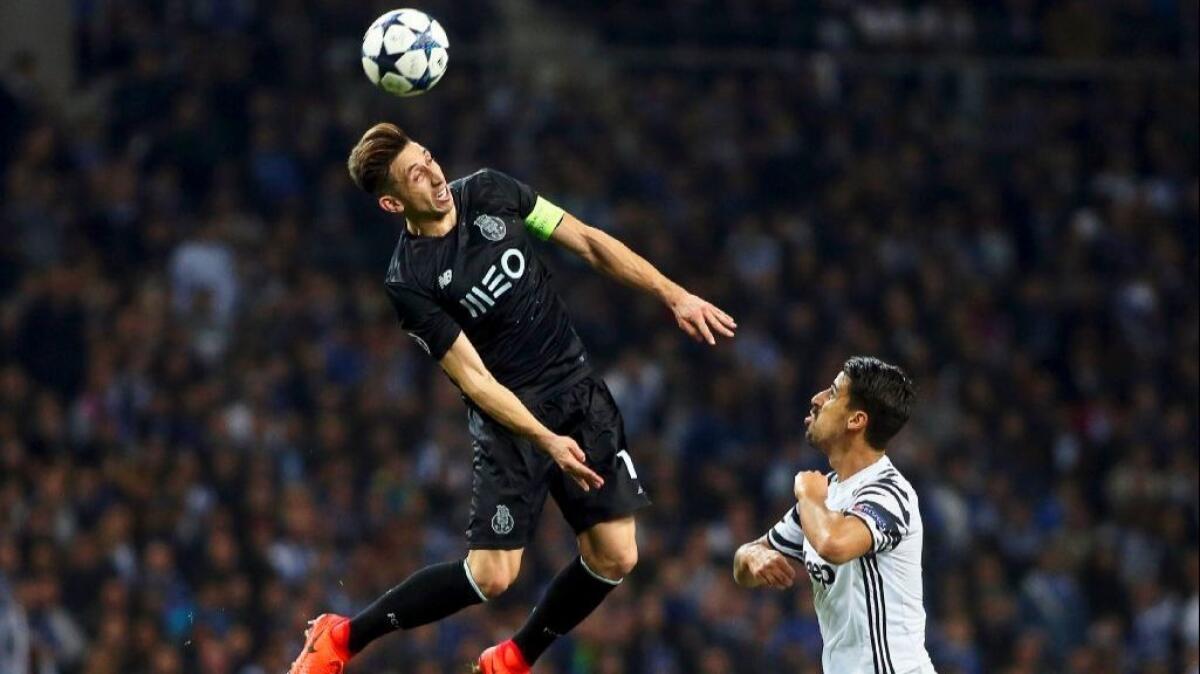Column: Mexican players finding comfort, success in Portugal

When Mexican national team players began streaming into Europe a decade ago, most landed in the predictable places: The English Premier League, Spain’s La Liga and Italy’s Serie A.
But in the last five years, Portugal’s Primeira Liga has emerged as a popular destination. Of the 11 European-based players called up by Mexico for this week’s World Cup qualifiers, three are with Portuguese clubs.
And that number could soon be growing.
“Portugal is a good environment to avoid a big cultural and football clash for a player coming from southern or Central America,” said Fernando Gomes, a legendary Porto player and now the scouting director for the club, home to four Mexicans. “The quality of the players, mixed with the characteristics of FC Porto, can produce a good mix for Mexican players.”
The best example of that may be midfielder Hector Herrera. After two years with Pachuca in the Mexican league he jumped, at 23, to Porto, where he was named team captain en route to playing in four straight Champions League tournaments.
“One of my goals as a player has always been to play in Europe,” Herrera, a Tijuana native, wrote in an email interview. “There were a few clubs interested but I thought FC Porto was the best choice and my experience here so far has proven me right.
“I joined thinking about evolving both as a player and as a man. The most valuable thing I’ve learned compared to Mexico was to play with higher intensity.”
Galaxy midfielder Joao Pedro, who played parts of three seasons in Portugal, said the Mexicans have improved the quality of play in the first-division league.
“They are really good players. They brought technical quality,” he said. “Very experienced players too.
“Of course they are national team players so they add something to the [league].”
But Pedro also believes many players, from Mexico and elsewhere, see the Primeira Liga as a portal to teams in Europe’s top-tier leagues.
“That’s how the Mexicans can show themselves to Europe,” he said.
None of the current national team players have made the jump from Portugal to bigger teams but many have used success in one country as a springboard to opportunities in another.
Javier “Chicharito” Hernandez played in the English Premier League, La Liga and the German Bundesliga in the last two seasons while Andres Guardado played in both Spain and Germany before landing in the Dutch Eredivisie.
“The more players they have in Europe the more strong the Mexican national team [becomes],” said Herrera, whose Porto teammates include national team defender Miguel Layun and injured forward Jesus Manuel Corona, who will miss this month’s qualifiers against Costa Rica and Trinidad and Tobago.
National team forward Raul Jimenez plays for Primeira Liga rival Benfica, which is headed toward its fourth straight title.
“I’m not saying the ones who play in Mexico are not as competitive,” Herrera continued. “But I believe it helps to have European experience. When mentalities are more open, I’m pretty sure we’ll have more Mexicans playing in Europe. There are a lot of young talents who can reach European level.”
Traditionally the move to Europe has been a difficult one for Mexican players. Not only is the food, weather and often the language different, but the competition is far stiffer as well.
Jared Borgetti, a legend with the national team, lasted just one dismal season with England’s Bolton Wanderers. And Cuauhtemoc Blanco had a forgettable 23-game loan to Spain’s Real Valladolid before returning to Mexico, a trip other national team players such as Pablo Barrera, Javier Aquino, Efrain Juarez, Guillermo Franco and Omar Bravo also made.
That’s changing, partly because a European pedigree is now considered essential for a world-class players. For example, of the 24 players originally named to the U.S. team for this week’s qualifiers, 14 played on the continent.
“For any player the ultimate goal, especially at their peak, should be playing in Europe,” Juan Carlos Osorio, coach of the Mexican national team, told Goal.com last year. Especially since seven of the 11 European-based players on his roster competed this year in the Champions League, the most prestigious club tournament in the world and one that has steeled his team for the rigors of international competition.
Gomes, the former Porto star, said landing in a place like Portugal, where the language and lifestyle is similar, can make that move smoother for many Mexicans.
“When a player changes from a club to another club, he needs time to adjust. When the change is from a league to another, it’s more difficult. Finally when the change is from a continent to another, then the process of adaptation really needs to be good,” he said.
“The Mexicans needed to pass the same process like the Brazilians. They needed to adapt to the pace of the game in Europe and learn difficult styles of play. It’s not fair to say that it’s more easy or difficult for Mexicans because each player has his own adaptation process. What we can say at the moment is that Mexicans we have in Porto are well-adapted and are developing.”
It’s worked for Herrera.
“It reminds us of home,” he said of Porto, Portugal’s second-largest city. “There are very similar habits and people are extremely nice and friendly. They look out for you and make you feel comfortable.
“That’s why Mexican players love to come to Porto even when they have good [offers] from other countries.”
Follow Kevin Baxter on Twitter @kbaxter11







